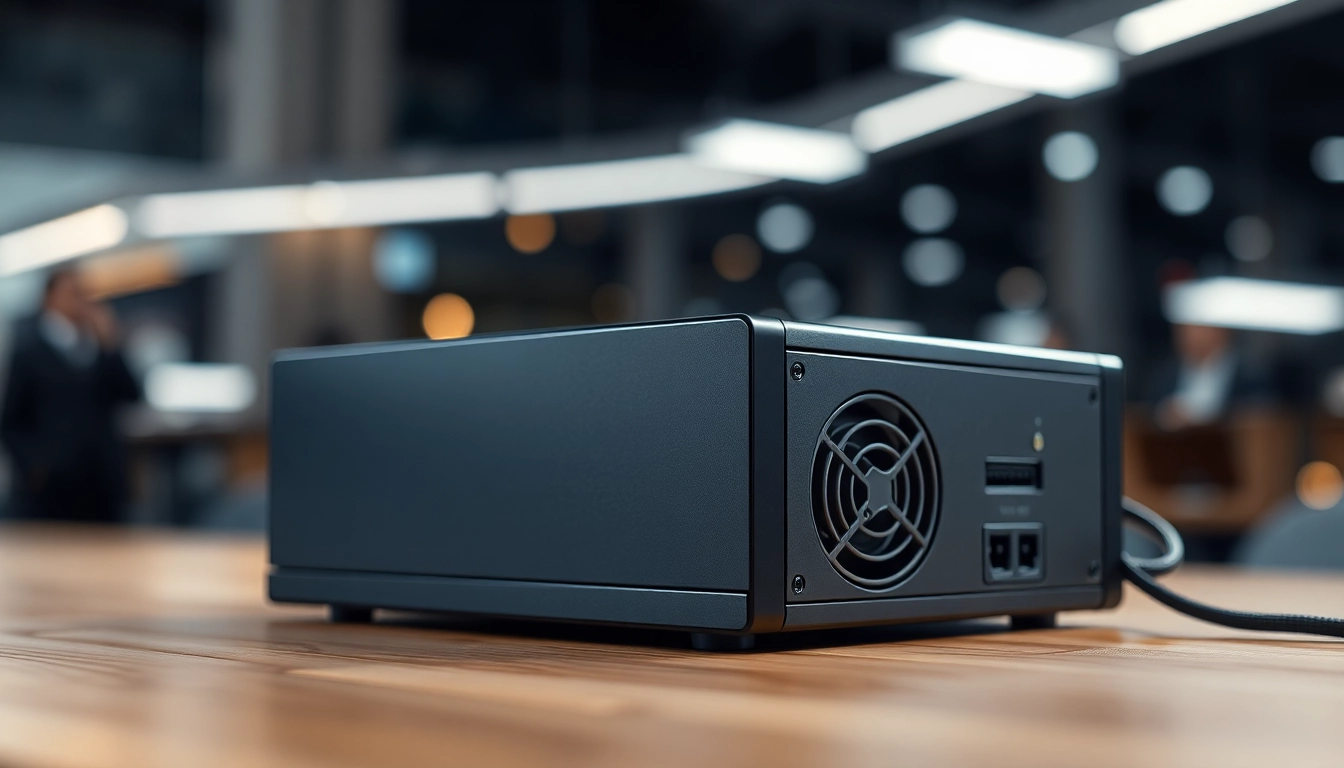Understanding Power Supply Manufacturers
In the world of electronics, power supplies are one of the most crucial components. They convert electrical power to the correct voltage, current, and frequency to power devices. Selecting the right Power Supply Manufacturer is essential for ensuring the reliability and efficiency of your electronic devices. In this article, we’ll explore what defines a quality power supply manufacturer, the types of power supplies available, and how to evaluate manufacturers effectively.
What Defines a Quality Power Supply Manufacturer?
A quality power supply manufacturer is characterized by their commitment to excellence in design, reliability, and performance. Key factors include:
- Efficiency: High-quality power supplies typically boast high efficiency ratings (80% and above) to minimize energy loss.
- Safety Certifications: Look for UL, CE, and FCC certifications that ensure compliance with safety standards.
- Warranty and Support: Good manufacturers offer substantial warranties and robust customer support.
- Reputation: Established brands often have a proven track record, as verified by user reviews and industry awards.
Key Characteristics of Leading Manufacturers
Leading manufacturers often share certain characteristics that set them apart from more average producers:
- Innovation: Continual investment in R&D to improve power supply technology.
- Product Range: Offering a diverse array of products tailored for different applications, such as home, industrial, and medical use.
- Quality Control: Stringent testing and quality assurance processes to ensure that every unit meets high standards.
- Customer Engagement: Actively engaging with the user community to gather feedback and improve products.
History and Evolution of Power Supply Manufacturing
The evolution of power supply manufacturing mirrors the broader advances in technology. Initially, power supplies were simplistic transformers, primarily used to convert and step down AC voltage. As the demand for electronics exploded in the late 20th century, power supplies advanced to include:
- Switching Power Supplies: Offering higher efficiency and smaller form factors.
- Modular Power Supplies: Allowing users to customize cables and optimize airflow.
- Smart Power Supplies: Incorporating microcontrollers for refined power management and monitoring.
Types of Power Supplies Offered by Manufacturers
Understanding the different types of power supplies is crucial for making informed purchasing decisions. Manufacturers typically offer several types:
AC vs. DC Power Supplies: Key Differences
Power supplies can be broadly classified into AC (Alternating Current) and DC (Direct Current) supplies, with each type serving specific applications:
- AC Power Supplies: Convert AC line voltage into stable output voltages that can be used to power electronic devices.
- DC Power Supplies: Provide a stable, constant source of DC voltage, common in batteries and electronic devices requiring specific voltage levels.
The choice between AC and DC often depends on the application, load requirements, and efficiency considerations.
Custom Power Supply Solutions Explained
Many manufacturers now offer custom power supply solutions tailored to specific needs. Customization may include:
- Voltage Output: Adjustments to meet unique voltage requirements.
- Size and Form Factor: Designing units to fit specialized spaces.
- Temperature Range: Developing units capable of operating in extreme conditions.
Investing in custom solutions can lead to significant performance improvements and energy efficiency.
Factors to Consider When Choosing a Type of Power Supply
Choosing the right power supply involves balancing several factors:
- Load Requirements: Determine the wattage and voltage requirements of your specific application.
- Efficiency Rating: Higher efficiency translates to lower operating costs over time.
- Environmental Conditions: Consider temperature, humidity, and other factors that may affect performance.
- Budget: While cheaper options may be tempting, investing in a reliable power supply offers better performance and reliability.
Evaluating Top Power Supply Manufacturers
As you assess potential power supply manufacturers, applying a systematic evaluation process can help in making well-informed decisions.
Criteria for Assessing Manufacturer Reputation
Consider the following criteria as you evaluate the reputation of manufacturers:
- Industry Standing: Research how long the company has been in business and its standing among competitors.
- Customer Feedback: Look for reviews and testimonials from other users aligning with your needs.
- Technical Support: Ensure the manufacturer offers robust technical assistance and a good warranty policy.
- Partnerships: Evaluating manufacturers with partnerships or certifications from other reputable companies enhances their credibility.
Comparative Analysis of Leading Brands
To gain insight into the landscape of power supply manufacturers, consider comparing leaders within the industry:
- Corsair: Known for high performance and reliability, especially in PC applications.
- Seasonic: Recognized for their innovative designs and efficiency.
- MEAN WELL: A staple in industrial and commercial applications for their robust offerings.
- EVGA: Popular among gaming enthusiasts for their high-quality power supply units.
Perform side-by-side comparisons of specifications, prices, and user reviews to help determine the best fit for your needs.
User Reviews and Community Feedback
User reviews play a critical role in determining the suitability of a power supply manufacturer. Platforms like Reddit and tech forums allow users to discuss and share experiences, offering valuable insights:
- Look for patterns in user feedback regarding reliability, support, and issue resolution.
- Engage with similar communities to gather real-world experiences and recommendations.
Trends in Power Supply Manufacturing
The power supply industry is undergoing significant transformations, largely driven by advances in technology and changing market demands.
Sustainability in Power Supply Production
As global awareness of environmental issues rises, many manufacturers are prioritizing sustainable practices in their production. This includes:
- Energy Efficient Designs: Manufacturers are creating power supplies that consume less energy.
- Recyclable Materials: Using eco-friendly materials that minimize environmental impact.
- Reduced Emissions: Incorporating cleaner manufacturing processes to lower carbon footprints.
Technological Innovations Shaping the Industry
Technological integration is at the forefront of advancements in power supplies:
- IoT Integration: Power supplies are now capable of data transmission and monitoring.
- Smart Features: Many modern power supplies include smart features like overheating protection and voltage regulation.
Future Forecast for Power Supply Manufacturers
Looking ahead, the power supply sector is expected to keep evolving:
- Increased Demand for Energy Efficiency: Businesses will continue pushing for more efficient systems.
- Growth in Renewable Energy Sources: Adaptations to support solar, wind, and other sustainable energy inputs.
- Customization and Modularity: Expect greater demand for modular designs that allow users to tailor systems to their needs.
Choosing the Right Power Supply Manufacturer for Your Needs
With countless options available, selecting the right power supply manufacturer can feel overwhelming. However, a structured approach can simplify the process.
How to Align Your Requirements with Manufacturer Offerings
Begin by clearly defining your requirements:
- Performance Needs: Specify wattage and current sufficiency based on your devices.
- Environmental Conditions: Consider where the power supply will be used, as that will affect its specification.
- Price Ranges: Set a manageable budget without compromising quality for cost.
Best Practices for Engaging with Manufacturers
When reaching out to potential manufacturers:
- Inquire About Custom Solutions: Discuss any unique needs that can’t be addressed by standard offerings.
- Request Detailed Specs: Ask for detailed product specifications, including efficiency ratings and certifications.
- Assess Manufacturer Responsiveness: The speed and quality of responses can give insights into customer service quality.
Resources for Ongoing Support and Guidance
After selecting a manufacturer, consider these resources for ongoing support:
- User Manuals: Refer frequently to user manuals for installation and operational guidance.
- Technical Support Forums: Engage with online technical communities for troubleshooting and shared experiences.
- Manufacturer’s Customer Support: Keep close contact with manufacturer support for ongoing assistance and updates.



